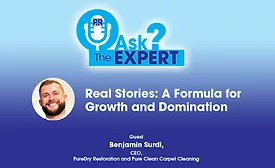Home » company culture
Articles Tagged with ''company culture''
Creating a Culture of Accountability
Setting Your Restoration Business Up for Long-Term Success
Read More
Real Stories: A Formula for Growth and Domination With Benjamin Surdi
Ask the Expert
November 18, 2021
Stay ahead of the curve with our eNewsletters.
Get the latest industry updates tailored your way.
JOIN TODAY!Copyright ©2025. All Rights Reserved BNP Media.
Design, CMS, Hosting & Web Development :: ePublishing














